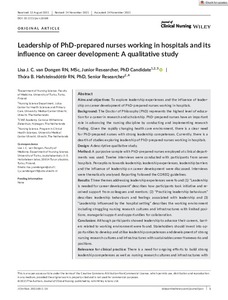Leadership of PhD-prepared nurses working in hospitals and its influence on career development: A qualitative study
van Dongen Lisa JC; Hafsteinsdóttir Thóra B
https://urn.fi/URN:NBN:fi-fe2022012710842
Tiivistelmä
Aims and objectives
To explore leadership experiences and the influence of leadership on career development of PhD-prepared nurses working in hospitals.
Background
The Doctor of Philosophy (PhD) represents the highest level of education for a career in research and scholarship. PhD-prepared nurses have an important role in advancing the nursing discipline by conducting and implementing research finding. Given the rapidly changing health care environment, there is a clear need for PhD-prepared nurses with strong leadership competences. Currently, there is a dearth of studies exploring leadership of PhD-prepared nurses working in hospitals.
Design
A descriptive qualitative study.
Method
A purposive sample with PhD-prepared nurses employed at clinical departments was used. Twelve interviews were conducted with participants from seven hospitals. Perceptions towards leadership, leadership experiences, leadership barriers and the influence of leadership on career development were discussed. Interviews were thematically analysed. Reporting followed the COREQ guidelines.
Results
Three themes addressing leadership experiences were found: (1) “Leadership is needed for career development” describes how participants took initiative and received support from colleagues and mentors; (2) “Practicing leadership behaviours” describes leadership behaviours and feelings associated with leadership and (3) “Leadership influenced by the hospital setting” describes the working environment including struggling nursing research cultures and infrastructures with limited positions, managerial support and opportunities for collaboration.
Conclusion
Although participants showed leadership to advance their careers, barriers related to working environment were found. Stakeholders should invest into opportunities to develop and utilise leadership competences and development of strong nursing research cultures and infrastructures with sustainable career frameworks and positions.
Relevance for clinical practice
There is a need for ongoing efforts to build strong leadership competences as well as nursing research cultures and infrastructures with career pathways and suitable positions for PhD-prepared nurses within hospitals to empower them to strengthen nursing.
Kokoelmat
- Rinnakkaistallenteet [19207]
